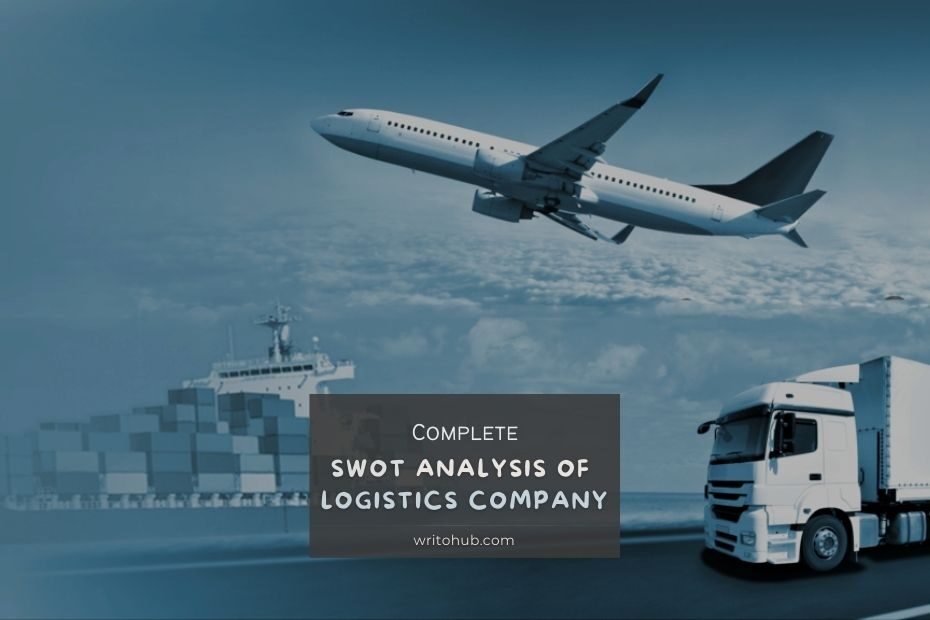The logistics industry plays a pivotal role in the global economy by facilitating the efficient movement of goods and services.
As competition intensifies and customer expectations evolve, logistics companies face unique challenges and opportunities.
Conducting a SWOT analysis can help these companies assess their strengths, weaknesses, opportunities, and threats, allowing them to devise effective strategies for sustainable growth and success.
Strengths in the SWOT Analysis of Logistics Company
- Efficient Transportation Network: A key strength of a logistics company lies in its well-developed transportation network. This includes an extensive fleet of vehicles, partnerships with carriers, and access to various modes of transportation like air, sea, road, and rail. An efficient network enables the company to deliver goods timely and cost-effectively.
- Technology Integration: Leading logistics companies leverage advanced technology solutions to optimize operations. Automated warehousing systems, route planning software, and real-time tracking capabilities enhance efficiency, reduce errors, and improve customer satisfaction.
- Diverse Service Offerings: A logistics company with a diverse range of services, such as freight forwarding, warehousing, distribution, and supply chain consulting, can attract a broader clientele and increase revenue streams.
- Industry Expertise and Experience: Accumulated experience and in-depth industry knowledge are valuable assets for a logistics company. Understanding specific industries’ requirements allows the company to offer tailored solutions and foster long-term partnerships.
Weaknesses in the SWOT Analysis of Logistics Company
- Dependence on External Partners: Logistics companies often rely on external partners, such as carriers and customs brokers. This dependence can lead to challenges in maintaining quality control and meeting service level agreements if these partners’ performance is subpar.
- Cost Fluctuations: Fluctuations in fuel prices, currency exchange rates, and regulatory changes can impact operating costs significantly. Failure to manage these cost fluctuations efficiently may affect profit margins and competitiveness.
- Limited Global Reach: Smaller logistics companies may face limitations in terms of global reach and may struggle to provide comprehensive international logistics solutions, restricting them to regional markets.
- Workforce Management: Skilled labor shortages and high employee turnover rates can hinder operational efficiency. A logistics company must focus on attracting and retaining skilled talent to maintain service quality.
Opportunities in the SWOT Analysis of Logistics Company
- E-commerce Growth: The booming e-commerce industry offers vast opportunities for logistics companies. Partnering with online retailers can lead to increased demand for last-mile delivery services and warehousing solutions.
- Sustainable Practices: As environmental concerns rise, there is a growing demand for eco-friendly and sustainable logistics solutions. Companies that invest in green practices, such as electric fleets and carbon offset programs, can differentiate themselves and attract environmentally conscious clients.
- Supply Chain Digitization: The ongoing trend of digitizing supply chains presents opportunities for logistics companies to offer end-to-end visibility and data-driven insights to their clients. This can improve supply chain efficiency and decision-making.
- Emerging Markets: Expanding operations into emerging markets with growing economies can provide a logistics company with a chance to tap into new customer bases and participate in developing supply chains in these regions.
Threats in the SWOT Analysis of Logistics Company
- Intense Competition: The logistics industry is highly competitive, with numerous global players vying for market share. Intense competition can lead to pricing pressures and the potential loss of key clients.
- Rapid Technological Advancements: While technology provides opportunities, it also poses threats. Failure to keep up with the latest technological advancements can render a logistics company obsolete or less competitive.
- Political and Trade Uncertainties: Political instability, trade wars, and geopolitical tensions can disrupt global supply chains and impact logistics operations, leading to delays and increased costs.
- Security and Regulatory Compliance: Stringent security measures and evolving regulations can pose challenges to logistics companies. Non-compliance can result in fines, penalties, and reputational damage.
Conclusion
A comprehensive SWOT analysis is crucial for a logistics company to navigate the complex and ever-changing supply chain landscape.
By capitalizing on their strengths, addressing weaknesses, and seizing opportunities, logistics companies can differentiate themselves, provide exceptional customer experiences, and stay ahead of the competition.
Embracing technological advancements, adopting sustainable practices, and expanding into emerging markets will be essential to meeting the evolving needs of clients and building a resilient and successful logistics enterprise.
